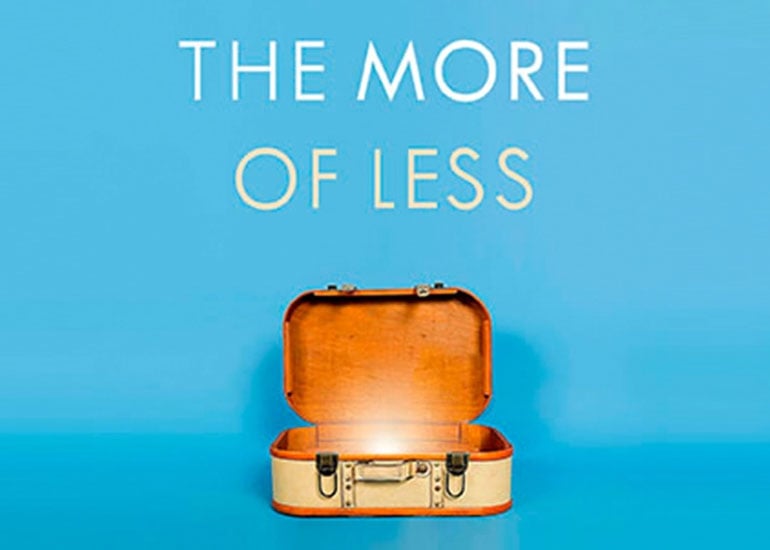
"Getting rid of what you don't need is the first step toward crafting the life you want." – Joshua Becker An avid proponent of minimalism, Joshua Becker is the Wall Street Journal and USA Today best-selling author of Simplify, The More of Less, and Clutterfree with Kids. He's also the cocreator of Simplify Magazine and founder and editor of Becoming Minimalist, a website dedicated to intentional living. In the following excerpt from The More of Less, Joshua details an eye-opening list of ways that minimalism actually expands our lives. by Joshua Becker There is more joy to be found in owning less than can ever be found in pursuing more. In a world that constantly tells us to buy more and more, we often lose sight of that. But consider the life-giving benefits. You can expect a payoff in every one of the following areas if you practice the principles of minimalism taught in The More of Less. Even if these universal benefits were the only reasons for practicing minimalism, they would be enough. But there's more. There's also the personalized benefit each of us can get from minimalism. Getting rid of what you don't need is the first step toward crafting the life you want. Excerpted from The More of Less: Finding the Life You Want Under Everything You Own by Joshua Becker. Copyright © 2016 by BecomingMinimalist.com. Published by WaterBrook, an imprint of Penguin Random House LLC.
Excerpt from Chapter 1, "The Universal Benefits of Minimalism"
- More time and energy—Whether we are making the money to buy them, researching and purchasing them, cleaning and organizing them, repairing them, replacing them, or selling them, our possessions consume our time and energy. So the fewer things we have, the more of our time and energy we'll have left to devote to other pursuits that matter more to us.
- More money—It's simple enough: By buying fewer things, we spend less money. Not just to acquire things in the first place but also to manage and maintain our goods.
Maybe your path to financial freedom comes not from earning more but from owning less. - More generosity—Living a less acquisitive, less costly lifestyle provides the opportunity to financially support causes we care about. Our money is only as valuable as what we choose to spend it on, and there are countless opportunities worth vastly more than material accumulation.
- More freedom—Excess possessions have the power to enslave us physically, psychologically, and financially. Stuff is cumbersome and difficult to transport. It weighs on the spirit and makes us feel heavy. On the other hand, every time we remove an unnecessary item, we gain back a little freedom.
- Less stress—Every added possession increases the worry in our lives. In your mind, imagine two rooms: one that is cluttered and messy, and another that is tidy and sparse. Which one makes you feel anxious? Which one makes you feel calm?
Mess + excess = stress. - Less distraction—Everything around us competes for our attention. These small distractions can add up and prevent us from giving attention to the things we care about. And these days, who needs more distraction?
- Less environmental impact—Overconsumption accelerates the destruction of natural resources. The less we consume, the less damage we do to our environment, and that benefits everyone, including our children's and grandchildren's generations.
- Higher-quality belongings—The less money you spend on an excess quantity of things, the greater your opportunity to purchase quality possessions when you need them. Minimalism is not necessarily the same as frugality. It is a philosophy recognizing that owning more stuff is not better; owning better stuff is better.
- A better example for our kids—What is the most common three-word phrase our children hear from us? Is it "I love you"? Or is it "I want that," "It's on sale," or "Let's go shopping"? It's important to give our children a framework with which to counteract the out-of-control lifestyle marketed to them.
- Less work for someone else—If we don't make the effort to sort through and pare down our possessions, then when we die or get to the point where we can't take care of ourselves anymore, someone else (probably a loved one) is going to have to take up that burden. By sticking to the minimalist path, we make it easier for the other person.
- Less comparison—Our natural tendencies cause us to compare our lives with those around us. Combine that with the fact that we seem to have a built-in desire to impress others by owning as much as possible, then as Will Rogers said, we've got a recipe for disaster. Purposefully owning less begins to take us out of the unwinnable game of comparison.
- More contentment—We tend to think that we can resolve our discontentment by getting the item whose lack is seemingly making us unhappy. Yet material possessions will never fully satisfy the desires of our hearts. (That's why discontentment always returns after a purchase.)
Only after we intentionally break the cycle of accumulating more, more, more can we begin to discern the true causes of discontentment in our lives.
Stay Informed
Sign up and receive insider offers and flash sales in your inbox every week